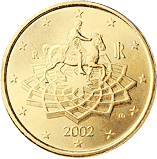Italian euro coins
Italian euro coins have a design unique to each denomination, though there is a common theme of famous Italian works of art from one of Italy's renowned artists. Each coin is designed by a different designer, from the 1 cent to the 2 euro coin they are: Eugenio Driutti, Luciana De Simoni, Ettore Lorenzo Frapiccini, Claudia Momoni, Maria Angela Cassol, Roberto Mauri, Laura Cretara and Maria Carmela Colaneri. All designs feature the 12 stars of the EU, the year of imprint, the overlapping letters "RI" for Repubblica Italiana (Italian Republic) and the letter R for Rome.[1] There are no Italian euro coins dated earlier than 2002, even though they were certainly minted earlier, as they were first distributed to the public in December 2001.
The choice of the design of the coins was left to the Italian public by means of a television broadcast where alternative designs were presented, letting the people vote by calling a certain telephone number. However, the 1 euro coin was missing in this election, because Carlo Azeglio Ciampi, the then economy minister, had already decided it would sport the Vitruvian man of Leonardo da Vinci. Leonardo's work is highly symbolic as it represents the Renaissance focus on man as the measure of all things, and has simultaneously a round shape that fits the coin perfectly. As Ciampi observed, this represents the "coin to the service of Man", instead of Man to the service of money.
Italian euro design
For images of the common side and a detailed description of the coins, see euro coins.
| € 0.01 | € 0.02 | € 0.05 |
|---|---|---|
 |
 |
The Colosseum in Rome |
| Castel del Monte, a 13th-century castle in Andria | Mole Antonelliana, a tower symbolising the city of Turin | Colosseum, famous Roman amphitheater |
| € 0.10 | € 0.20 | € 0.50 |
 |
Unique Forms of Continuity in Space |  |
| The Birth of Venus by Sandro Botticelli | Futurist sculpture Unique Forms of Continuity in Space by Umberto Boccioni | Equestrian Statue of Marcus Aurelius |
| € 1.00 | € 2.00 | € 2 Coin Edge |
| Vitruvian Man | Dante Alighieri | |
| Vitruvian Man, a drawing by Leonardo da Vinci | Dante Alighieri, a portrait by Raphael |
Circulating mintage quantities
| Face Value[2] | €0.01 | €0.02 | €0.05 | €0.10 | €0.20 | €0.50 | €1.00 | €2.00 |
|---|---|---|---|---|---|---|---|---|
| 2002 | 9,348,599,501 | 1,098,866,250 | 1,341,442,204 | 1,142,083,000 | 1,411,536,000 | 1,136,418,000 | 965,725,300 | 463,402,200 |
| 2003 | 9,637,000 | 21,555,000 | 1,844,000 | 29,714,000 | 25,893,000 | 44,563,000 | 66,230,000 | 36,098,000 |
| 2004 | 99,925,000 | 119,925,000 | 9,925,000 | 4,925,000 | 4,925,000 | 4,925,000 | 4,925,000 | 6,925,000 |
| 2005 | 179,943,900 | 119,943,900 | 69,943,900 | 99,943,900 | 4,943,900 | 4,943,900 | 4,943,900 | 61,943,900 |
| 2006 | 158,951,700 | 195,951,700 | 118,951,700 | 179,951,700 | 4,951,700 | 4,951,700 | 107,951,700 | 9,951,700 |
| 2007 | 214,953,000 | 139,953,000 | 84,953,000 | 104,953,000 | 4,953,000 | 4,953,000 | 134,953,000 | 4,953,000 |
| 2008 | 180,000,000 | 135,000,000 | 90,000,000 | 105,000,000 | 5,000,000 | 5,000,000 | 135,000,000 | 2,500,000 |
| 2009 | 174.952.000 | 184.952.000 | 84.952.000 | 105.952.000 | 59.952.000 | 2.452.000 | 114.952.000 | 1.952.000 |
| 2010 | 125.448.100 | 120.243.400 | 67.618.100 | 91.328.400 | 57.787.000 | 9.209.800 | 96.533.100 | 5.788.100 |
| 2011 | ** | ** | ** | ** | ** | ** | ** | ** |
|
* No coins were minted that year for that denomination | ||||||||
Identifying marks
| National Identifier | RI |
| Engravers Initials | Different for each coin |
| €2 Edge inscription | |
€2 commemorative coins
 50th Anniversary of the Signature of the Treaty of Rome (2007)
50th Anniversary of the Signature of the Treaty of Rome (2007) 60th Anniversary of the Universal Declaration of Human Rights (2008)
60th Anniversary of the Universal Declaration of Human Rights (2008)
References
- Eurocoins in Italy
- "Circulating mintage quantities". Henning Agt. Retrieved 19 August 2008.
External links
| Wikimedia Commons has media related to Euro coins of Italy. |